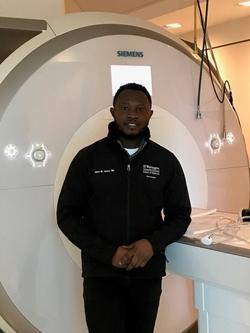April 6, 2018
Recognizing Impact: Albert Isaacs, MD
Dr. Isaacs is a 4th year neurosurgery resident here at the University of Calgary, who, throughout his training has cared for many babies afflicted with PHH (post-hemorrhagic hydrocephalus). This occurs in one out of every three babies who are born prematurely and sustain spontaneous bleeding into their brain. Unfortunately, 50% of these babies develop the condition known as PHH, whereby the brain’s ability to turn over its own cerebrospinal fluid (CSF) is impaired, leading to an over accumulation of fluids within pockets of the brain, known as the ventricles. The abnormally enlarged ventricles place significant pressure on the brain, impairing both function and development. Consequently 70-80% of affected babies with PHH are developmentally delayed, have cerebral palsy or are debilitated by intractable seizures. As a result of his experiences, Dr. Isaacs has now taken a leave of absence from clinical duties in order to pursue a PhD in neuroscience, focusing on understanding the causes of this disease. Dr. Isaacs’ research focuses on using high throughput CSF proteomics, DNA metagenomics and RNA sequencing transcriptomics to identify markers of PHH that can be targeted to treat and monitor this disease. In addition, he has developed animal models of PHH in ferrets and mice that are being used to study the role of oxidative metabolism in the pathophysiology of hydrocephalus, utilizing the 9.4T MRI in the Experimental Imaging Centre at the University of Calgary.
Worldwide, hydrocephalus affects every 2 in 1000 newborn babies, and is a significant cause of morbidity and mortality. However, it has garnered very little scientific attention and yet it offers an unprecedented opportunity to make significant global health impacts as the timely diagnosis, treatment and prevention have the potential to obviate the devastating effects of this disease. Dr. Isaac’s research has the potential to prevent the negative outcomes of this disease both in our community and the province of Alberta and possibly to reduce the burden of this disease worldwide through the discovery of robust therapies.
The CSF samples Dr. Isaacs is working with have been obtained through a major infrastructure including pediatric health centers across Canada, the United States and Uganda. This multi-institutional collaboration has been a major benefit to the University of Calgary. Dr. Isaacs’ work and the depth of his scientific inquiry into understanding the pathophysiology of disease is the first of its kind in Canada. In fact, he is presently working with our collaborators who are world-renowned experts in hydrocephalus research at the Washington University School of Medicine and Penn State College of Medicine in the United States. This has been made possible through the University of Calgary’s Cotutelle Program, which was facilitated by the Faculty of Graduate Studies, Department of neuroscience, Division of Neurosurgery, and the Experimental Imaging Center at the University of Calgary. Drs. Jeff Dunn (Department of Radiology) and Mark Hamilton (Division of Neurosurgery) are Dr. Isaacs’ PhD supervisors, with instructional input from Dr. Eric Smith (Division of Neurology).

Albert Isaacs, MD
